
1911 Building columns glow from morning Fall sun.
Sometimes a few days can impact lives more than weeks spent in a classroom. That’s the idea behind the Alternate Service Break trips sponsored by several NC State organizations. Three students who traveled to Atlanta and Greensboro with the Women’s Center and Multicultural Student Affairs over fall break allowed the Digest to publish some of their reflections on their experiences.
Reflection 1
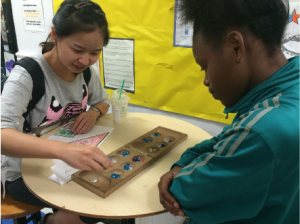 I was playing a game with a girl in the Boys and Girls Club. She was very nice and asked us if we wanted to play the game with her. She taught me how to play it patiently. I felt that I was not there to help her; actually we were spending time with each other. It is true from our reflection session that we are not there for them; we are there with them. It changed my mind about volunteering. When I think in this way, I gain more energy for service. Service has powerful feedback as well.
I was playing a game with a girl in the Boys and Girls Club. She was very nice and asked us if we wanted to play the game with her. She taught me how to play it patiently. I felt that I was not there to help her; actually we were spending time with each other. It is true from our reflection session that we are not there for them; we are there with them. It changed my mind about volunteering. When I think in this way, I gain more energy for service. Service has powerful feedback as well.
Reflection 2
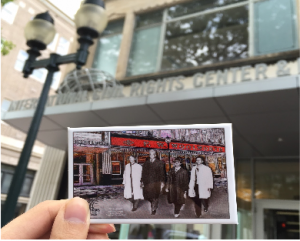 After I bought the magnet I took this photo outside of the International Civil Rights Center in Greensboro. It was the first time I heard about the story of these four African American students who started to gain civil rights for African Americans. I was so inspired by their courage. There is a saying in China, “If you do not dare to stand up for someone, there will be no to one stand up for you in the future.” I believe every country has its own civil rights issues. Every citizen has the duty to lead for the right values in society.
After I bought the magnet I took this photo outside of the International Civil Rights Center in Greensboro. It was the first time I heard about the story of these four African American students who started to gain civil rights for African Americans. I was so inspired by their courage. There is a saying in China, “If you do not dare to stand up for someone, there will be no to one stand up for you in the future.” I believe every country has its own civil rights issues. Every citizen has the duty to lead for the right values in society.
Reflection 3
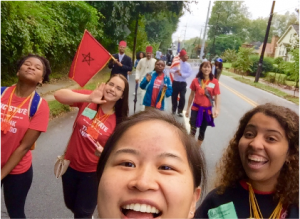 It was such an amazing trip and I met many nice friends! We lived together, did service together, explored Atlanta together! I chose ASB Atlanta because I wanted to know more about America, including civil rights issues, which I learned a lot about during the trip. And I also want to be immersed in American culture as well. I think I have a better understanding about American culture after the trip and learned a lot of words for living, even it is just a kind of pizza named calzone. 🙂 It is so worth it to be a member of the Atlanta trip during my time at NC State!
It was such an amazing trip and I met many nice friends! We lived together, did service together, explored Atlanta together! I chose ASB Atlanta because I wanted to know more about America, including civil rights issues, which I learned a lot about during the trip. And I also want to be immersed in American culture as well. I think I have a better understanding about American culture after the trip and learned a lot of words for living, even it is just a kind of pizza named calzone. 🙂 It is so worth it to be a member of the Atlanta trip during my time at NC State!
Tiantian is a grad student at NC State.
I was born in China. And my communities before were simple and peaceful because they were always full of families and friends. Before I came to America, I studied in the Chinese education system, which is very different from American. Though I had some chances to go abroad, those temporary experiences are far away from my current life in America. I was with many familiar friends in all the foreign experiences before, but this time I need to take care of myself in an unfamiliar environment. Communities now are diverse and nice as well. My classmates are from all over the world; I almost learn new things every day. I will participate in as much different activities as I can. In these communities I feel I am more open to different kind of things; in other words, it enlarges my capabilities. It means I am becoming a better person to be involved in these communities. The community that enhances my sense of well-being is usually friendly, considerable, helpful, inspiring. My ideal community would be diverse but unite as one. Though we are different from each other, we have the same goal: we can help each other. It increases everyone’s happiness.
Tiantian is a grad student at NC State.
I was born in Fort Lauderdale, Florida in December of 1995. I lived in the same house my whole life until I went to college, which allowed for me to establish really strong bonds to my community. But even within my geographical community of Ft. Lauderdale, I had a sense of belonging to many communities. I felt like I was part of the Latino community, as I grew up in a house with my half-Colombian mom and my Colombian grandmother, who raised me while my mom was at work. I also felt a sense of belonging at school, where I mostly grew up with the same people throughout elementary, middle and high school. But overall, I felt like I had a good understanding of what ‘home’ was, and that helped me become the person that I am today.
I now live in a new state, go to a new school, have new friends, and belong to a bunch of new communities. Moving to North Carolina allowed me to pick my own communities to be a part of and helped me feel independent while also making me feel at ‘home’ in a whole new way. Now, I am a member of the Raleigh community, and I am part of the NC State Community. To be a part of these is to have common ground with thousands of people who love being here as much as I do. They know how it feels to wake up at 8:00 a.m. for classes, how it feels to get stuck in traffic on Western Blvd., how beautiful it is when it first starts snowing, and how annoying and gross that snow is an hour later. We mutually understand what it means to be part of this community.
This understanding that I have with the people around me helps me stay happy and enhances my well being by giving me a sense of peace. When I wake up every day and leave my house, I’m happy. I feel like being a member of my various communities really contributes to this and helps me achieve my best. My ideal community is very similar to the one I live in now. I would feel connected to the people around me and happy to be a member. Becoming a part of these communities in North Carolina gave me this feeling, but it is a conscious choice I was able to make for myself.
Elizabeth Grindell is a senior at NC State.
For 18 years of my life, I lived in Chapel Hill, and for the last year and a half, I lived in Raleigh. Even though I didn’t move much geographically, I moved between a number of different communities. At first, these communities were determined by my family and my school, but eventually my interests and passions determined which communities I call my own.
I grew up in an upper middle class predominantly white neighborhood in the Morgan Creek Valley, just a few miles from UNC. As a kid, I would go fishing in the creek with my mom when she had time off from work. The first community I experienced other than my immediate family and neighbors was a community preschool that the Unitarian Universalists ran and the church my family attended, United Church of Christ. My memories of preschool are generally positive. The highlight of this experience were the special occasions when we had banana bread for snack. United Church of Christ was more contentious for me. My father, a high school science teacher, and my mother, a medical doctor, had taught me a bit more skepticism than five-year-olds are supposed to have in Sunday school.
In kindergarten, I learned the days of the week because on Tuesdays and Thursdays we had gym, which I realized I could avoid by pretending to be too tired to get up after nap time. In elementary school and middle school, I learned an unhealthy sense of superiority by being placed in a gifted program. Some part of my identity became wrapped up in this idea of being smart. Fortunately, I grew out of it for the most part. The communities I participated in during high school were particularly impactful. I sang in choir and performed in theater. Choir taught me that I am extroverted and that I like hugs and that I like being open. Theater taught me to see a wider range of human expression and to see play acting as practice for action.
One community that is particularly significant to me is Friends (Quaker) Meeting. I started going to Friends Meeting in middle school. This community helped me to form my beliefs. In particular, the belief that there is “that of God” in every person couples with my belief in human rights. Friends Meeting helped me to form my belief that violence is unjustifiable and helped me to see that peace if possible if we work for peace.
So far at NC State, I have joined a number of communities but these communities have not completely fulfilled what I look for in a community. I am a member of the Honors College, which is a positive experience, but I see it more as the dorm where I live than as a community I am invested in. Last year and last summer, I worked in Dr. Lindsey’s research lab, but this experience was stressful. Work came first and community came second. The group that seems the most like community to me is The Movement in the Women’s Center. I joined this group last year and have made a number of good friends in this organization.
For me, the ideal community would consist of different features of the communities I have been a part of. I would like a community that makes me feel loved and supported and also shares some common goal or purpose. I think the ideal community would be free of social and racial segregation and stratification. It’s difficult to imagine an ideal community within a flawed society, but this is what communities of resistance attempt to be.
Carl Hintz is a second-year student at NC State.
Reflection 1
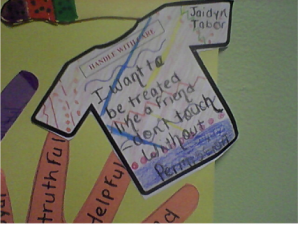 This picture made me feel both joy and sadness. Jaidyn writes in eloquent crayon, “I want to be treated like a friend don’t touch Without Permission.” I feel joy because if children learn to treat others like friends and learn to touch only if they have permission, then these children will become adults who know what consent is and who will be able to have loving, fulfilling and healthy relationships. If children learn that their lives and bodies are worth infinitely more than the space, food and air they need to survive then these children will become the compassionate leaders of the future who are able to navigate conflict with bravery and work for peace and justice with tenacity. I feel sadness because boys are not taught to ask permission or to be kind and considerate. I feel sadness because children face abuse, violence and poverty both from within their communities and from government policies. Black and Latina girls who live in poverty are told routinely in media that they are worthless.
This picture made me feel both joy and sadness. Jaidyn writes in eloquent crayon, “I want to be treated like a friend don’t touch Without Permission.” I feel joy because if children learn to treat others like friends and learn to touch only if they have permission, then these children will become adults who know what consent is and who will be able to have loving, fulfilling and healthy relationships. If children learn that their lives and bodies are worth infinitely more than the space, food and air they need to survive then these children will become the compassionate leaders of the future who are able to navigate conflict with bravery and work for peace and justice with tenacity. I feel sadness because boys are not taught to ask permission or to be kind and considerate. I feel sadness because children face abuse, violence and poverty both from within their communities and from government policies. Black and Latina girls who live in poverty are told routinely in media that they are worthless.
In one photo, this is why I chose to do ASB Atlanta. Visiting Girls Inc. gave me the chance to see feminist theory in practice. What makes Girls Inc. significant is not just that it is a female space. Indeed, gender is a learned performance not a biological destiny. Women and men are both equally capable of misogyny. Girls Inc. is significant because it is committed to creating a pro-girl space that supports Black and Latina students who face specific struggles stemming from racism, heterosexism and classism. I appreciated Girls Inc.’s philosophy of meeting the developmental needs of children as well as incorporating and empowering youth voice and choice in their programming. Ideologically, I agree with their decision to focus on “Girl’s Rights.” I appreciate that they do not shy away from the barriers or challenges that their students face, but rather develop ways of addressing those challenges. For example, Girls Inc combats prejudiced and manipulative media by teaching media literacy. When faced with the lack of representation of women of color in various professions, Girls Inc. creates their own representation, making their own pictures of scientists, economists, lawyers doctors and politicians to put in the hallway. The loving environment that this organization created in the face of a hostile and virulent society makes me want to be an educator.
Reflection 2
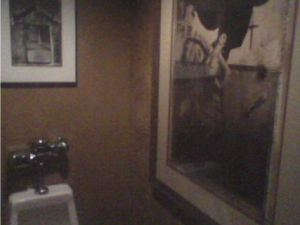 Agave Restaurant is “an eclectic southwestern eatery appeals to a wide cross-section of taste and styles while focusing on guest satisfaction in the high energy dining room & bar” located on 242 Boulevard SE Atlanta, GA 30312. Agave inspires generally positive reviews and sports a 4-star rating on yelp. Meanwhile, Agave’s men’s bathroom sports casual sexist imagery. The picture to the right of the urinal is intended to improve the male customer’s peeing experience, a goal that on the surface seems well aligned with Agave’s commitment to “guest satisfaction.” The woman displayed in the image is conventionally attractive (white and slender with large breasts) and the image is intended to represent her presumed sexual availability. The positionality of sexual images of women in men’s bathrooms is routine and reflects the misogynistic belief that women should be treated like shit and that a woman’s worth is based only on her appearance and her sexual appeal. A passage from The Color Purple by Alice Walker comes to mind.
Agave Restaurant is “an eclectic southwestern eatery appeals to a wide cross-section of taste and styles while focusing on guest satisfaction in the high energy dining room & bar” located on 242 Boulevard SE Atlanta, GA 30312. Agave inspires generally positive reviews and sports a 4-star rating on yelp. Meanwhile, Agave’s men’s bathroom sports casual sexist imagery. The picture to the right of the urinal is intended to improve the male customer’s peeing experience, a goal that on the surface seems well aligned with Agave’s commitment to “guest satisfaction.” The woman displayed in the image is conventionally attractive (white and slender with large breasts) and the image is intended to represent her presumed sexual availability. The positionality of sexual images of women in men’s bathrooms is routine and reflects the misogynistic belief that women should be treated like shit and that a woman’s worth is based only on her appearance and her sexual appeal. A passage from The Color Purple by Alice Walker comes to mind.
“Most times I pretend I ain’t there. He never know the difference. Never ast me how I feel, nothing. Just do his business, get off, go to sleep.
She start to laugh. Do his business, she say. Do his business. Why, Miss Celie. You make it sound like he going to the toilet on you. That what it feel like, I say.”
This illustrates the human cost of misogynistic ideology and imagery. Miss Celie experienced an exploitative sexual relationship in which she is dehumanized and treated like a toilet, for a man to “do his business.” Miss Celie’s experience of sexual abuse is both racial and gendered in nature as contextualized by the setting, 1930s (segregation/sharecropping era) rural Georgia. The violence Miss Celie experiences is inseparable from the history of chattel slavery in the U.S., but her experience is unique in that she is eventually able to leave and start her own sewing business.
In many ways 2015 Atlanta is different from 1930’s Georgia, but as Patricia Hill Collins suggests, we need to develop a “Black Sexual Politics” to understand the world we live in. Like many restaurants, Agave restaurant is a white-male owned company in which predominately working-class women serve predominantly white middle-class customers in a recently gentrified area. Customers may eat until they feel pleasantly bloated, at Agave, the Best Southwestern Restaurant in Atlanta, Georgia, a state where 1 in 5 people are food insecure.
Reflection 3
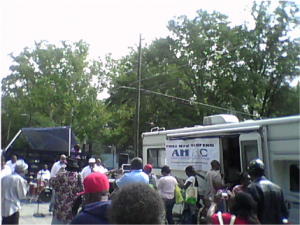 This photo is from the Festival of Lights in Historic Westside, Atlanta, Georgia. The Atlanta Harm Reduction Coalition offered free HIV testing and gave out condoms while a number of bands and musicians performed. A middle-aged couple danced with the music, sharing their grace and enthusiasm with anyone who cared to watch. The Atlanta Harm Reduction Coalition (AHRC) has effectively dissipated some of HIV’s stigma. Their language is positive, suggesting that you “Find out your HIV status today!” In addition to HIV services, AHRC offers nutrition programs, overdose prevention services, Hepatitis C services, as well as peer support and advocacy.
This photo is from the Festival of Lights in Historic Westside, Atlanta, Georgia. The Atlanta Harm Reduction Coalition offered free HIV testing and gave out condoms while a number of bands and musicians performed. A middle-aged couple danced with the music, sharing their grace and enthusiasm with anyone who cared to watch. The Atlanta Harm Reduction Coalition (AHRC) has effectively dissipated some of HIV’s stigma. Their language is positive, suggesting that you “Find out your HIV status today!” In addition to HIV services, AHRC offers nutrition programs, overdose prevention services, Hepatitis C services, as well as peer support and advocacy.
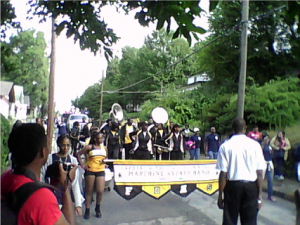 This is a pertinent example of social justice work. Health outcomes are experienced differently based on race, class, gender and sexuality. This is particularly visible in the case of HIV, which was stigmatized as “a virus for gays and drug users.” The public policy response to HIV was at best neglectful. I believe that the strategy of harm reduction and risk mitigation are particularly effective. It is not necessarily possible or ethical to eliminate a potentially risky behavior but it possible to offer empowering options that give someone greater control over their health outcomes.
This is a pertinent example of social justice work. Health outcomes are experienced differently based on race, class, gender and sexuality. This is particularly visible in the case of HIV, which was stigmatized as “a virus for gays and drug users.” The public policy response to HIV was at best neglectful. I believe that the strategy of harm reduction and risk mitigation are particularly effective. It is not necessarily possible or ethical to eliminate a potentially risky behavior but it possible to offer empowering options that give someone greater control over their health outcomes.
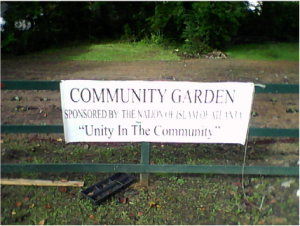 I am particularly interested in violence prevention projects. I would like to learn more about whether it is possible to apply risk mitigation strategies to prevent interpersonal violence. I would like to learn about strategies to help people heal from trauma.
I am particularly interested in violence prevention projects. I would like to learn more about whether it is possible to apply risk mitigation strategies to prevent interpersonal violence. I would like to learn about strategies to help people heal from trauma.
I have an ongoing interest in working to improve sex education so that it teaches about consent, healthy relationships, sexuality and safe sex. I think it is essential to develop programming in a culturally relative manner that meets the specific needs of a community.
Carl Hintz is a second-year student at NC State.